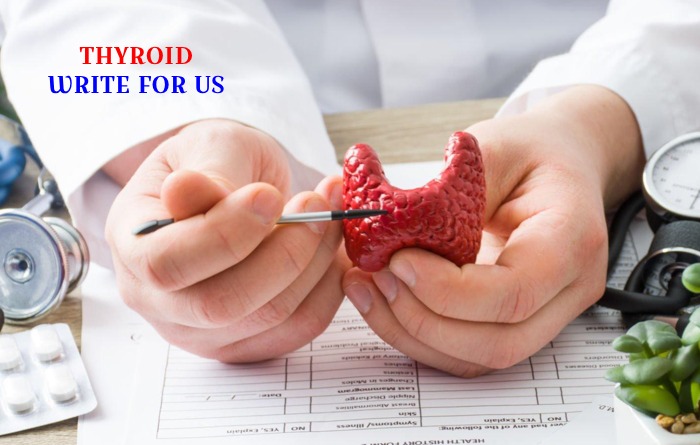Thyroid Write For Us

Thyroid Write For Us: The thyroid is a gland that regulates the function of important organs such as the heart, brain, liver, and kidneys. It produces the hormones T3 (triiodothyronine) and T4 (thyroxine). In this way, it ensures the balance of the organism. The gland has a butterfly shape (with two lobes) and is located in the anterior part of the neck, just below the Adam’s Pomo.
The thyroid is relatively tiny about other organs in the human body, but it is one of the most prominent glands, as it can reach up to 25 grams in an adult. It acts directly on the growth and development of children and adolescents, regulating menstrual cycles, fertility, weight, memory, concentration, mood, and emotional control.
When the thyroid does not work correctly, it can release too little hormone (hypothyroidism) or too much (hyperthyroidism). In both cases, the gland’s volume increases, known as a goiter. These problems can occur at any stage of life and are simple to diagnose.
Synthesis and Secretion of Thyroid Hormones
The apical region of the follicular cells faces the lumen of the follicle, while the basal area is juxtaposed to the bloodstream. Thus, when an increased demand for thyroid hormones occurs, thyroid-stimulating hormone (TSH) binds to the receptor on the basolateral surface of the follicular cells.
This binding promotes reabsorption of follicular Tg into the cell and proteolysis in the cytoplasm. To make the mechanism more didactic, let’s divide the process into phases:
1st Phase: Iodide pump or iodide capture
For the necessary amount of thyroxine to be formed in the body, one must ingest about 1mg/week of iodine in the form of iodide.
Therefore, It Is Interesting To Include In Your Diet:
Iodized Or Sea Salt
Iodine is essential for correct thyroid performance, and the daily recommendation of the World Health Organization (WHO) is 5 grams.
Saltwater Fish, Shellfish, And Seaweed
These options are excellent sources of nutrients, as they are foods rich in iodine and highly recommended for salt-restricted diets. However, opt for balanced doses: excess iodine can cause hyperthyroidism.
Chestnuts
Selenium, present in chestnuts, assists in producing TSH (thyroid-stimulating hormone), which stimulates the thyroid’s production of T3 and T4 hormones. Deficiency of this nutrient also increases the risk of Hashimoto’s Thyroiditis.
Here Are Some Food Must And Should Avoid
Soy
If consumed in excess, it can bring disadvantages to the functioning of the thyroid, as it is food considered goitrogenic. It is healthy to eat the grain, but in excessive amounts, soy can damage the gland, decreasing hormone production and leading to hypothyroidism.
Cruciferous Vegetables
Vegetables such as kale, broccoli, Brussels sprouts, and cauliflower consumed more than the raw form can reduce iodine uptake by the thyroid gland. The consequence is a deficiency in hormone synthesis, leading to other dysfunctions in the gland.
Pink Salt
Pink salt is not as good as it is reputed to be. Because it does not contain iodine in its composition, it has practically the same amount of sodium as table salt. Therefore, I prefer iodized salt or sea salt.
Conclusion
Blood tests, imaging studies, and surgical procedures are used to identify thyroid problems. Depending on the severity, treatment options include hormone replacement therapy, drugs, radioactive iodine therapy, or surgery. For total health, regular management and monitoring are essential.
How to Submit Your Articles?
To Write for Us, you can email at contact@Healthandblog.com
Guidelines of the Article Thyroid Write For Us
- We at HealthandBlog welcome fresh and unique content related to Thyroid
- HealthandBlog allows a minimum of 500+ words related to Thyroid.
- The editorial team of HealthandBlog does not encourage promotional content related to Thyroid.
- To publish the article at HealthandBlog, email us at contact@Healthandblog.com
- HealthandBlog allows articles related to Health, Beauty, Fitness, Diet, etc.
Which Categories Are Providing Healthandblog
Why to Write for Health And Blog – Thyroid Write For Us
Writing for HealthandBlog can expose your website to customers looking for Thyroid.
HealthandBlog’s presence is on Social media, and we will share your article with the Thyroid-related audience.
You can reach out to Thyroid enthusiasts.
